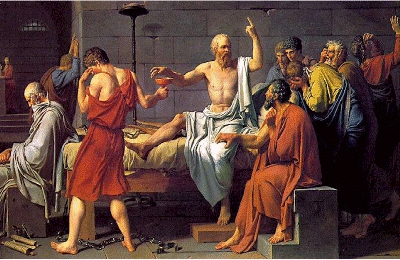Weather permitting, the first 2/3s of class will take place outside, with the trial occurring inside.
Discuss homework answers.
Brief overview of the Apology :
Apology
-
- Miletus brings Socrates to trial. Accuses him of:
- i. Corrupting the youth
- ii. Teaching about supernatural beings, not believing in the gods.
- Corruption?
- i. Does he alone harm the youth in Athens? Yes. All of Athens improves them? Yes. But think about trainers, and you’ll see it’s usually the opposite. One trainer improves a horse whereas the rest of society harms them.
- ii. Is it better to live in a good or bad community? Good. Then why would Socrates corrupt the youth? He would then live in a bad community and this would be bad for him.
- Supernatural?
- i. Wouldn’t teach about supernatural beings if he didn’t believe in them, so if he is teaching about them then he does believe in the gods. Clearly this is a contradiction. He can only do one of these, not both.
- Won’t bring in family to cry for him, even though this is traditional in Athens court.
- Found Guilty
- Asked to suggest his own punishment (if it’s rejected, the penalty is automatically death): “Free maintenance at the state’s expense”. Okay, maybe that’s too much, I’ll pay one mina (definitely no more than $20.)
- This punishment is rejected.
- “I would much rather die as a result of this defense than live as a result of the other sort.”
- “Death is either a loss of consciousness, and then a marvelous gain, or else he goes to “heaven” and meets all the great men of the past. So either way it’s a good thing.
- Has ample opportunity to escape, chooses not to.
- Miletus brings Socrates to trial. Accuses him of:
READ: THE APOLOGY, Take notes for trial.
Select a defense and prosecution team, and students to play Miletus and Socrates. The remaining students will make up the jury.
INK SHEDDING: While these teams are preparing for the trial, the jurors will perform an ink-shedding activity. Ink-shedding: every student starts by answering one of several proposed questions about Socrates. After five minutes, everyone stops and trades papers with someone else. They read the paper they get and respond to that discussion. After five more minutes, we trade again, making sure not to get our own paper back. This goes through several iterations, allowing everyone to think and write about different issues from different perspectives. We then come together as a class to discuss the results and most interesting responses.
Questions:
- Do you believe that Socrates was a benefit or harm to Athenian society? Why?
- Do you believe Socrates was correct in accepting the verdict of the trial? Why?
In this trial, I have the scholars not on the prosecution or defense serve as the jury. I tell them that they must come up with a unanimous decision and we will end class with a candy party. If they’re not able to come to a unanimous decision, I will declare a mistrial and we will have to do it over again. However, ahead of time I pick out one scholar to be a mole and ask them to refuse to allow the jury to reach a unanimous decision. This leads to a great deal of frustration. Once this frustration reaches a peak, I stop them and tell them what I’ve done, explaining that the scholar is serving as an example of Socrates. This allows them to see a more negative side of Socrates, which is often difficult for students to understand.
Debrief on the role of dialectic and how it could possibly be harmful as well as beneficial.
Homework: Ask other scholars what they think happiness is and what makes them happy. Record these in journal.
